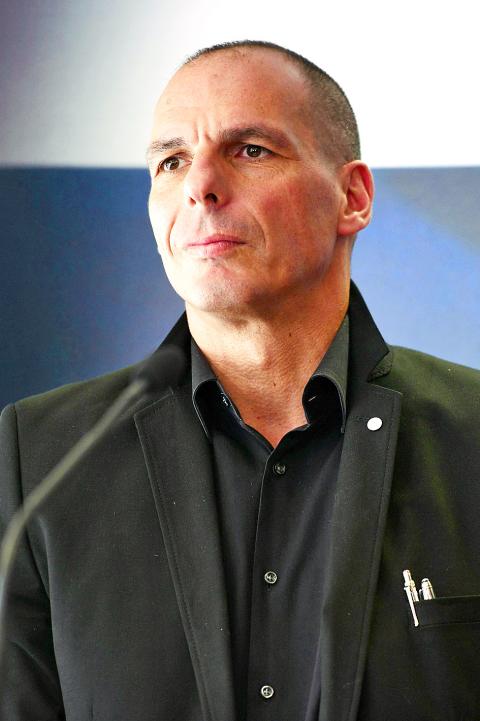Greek Minister of Finance Yanis Varoufakis on Saturday said that Greece would not require a new bailout from its international creditors if they would simply restructure its debt.
Athens last week resumed talks with its creditors in a bid to unblock 7.2 billion euros (US$8.06 billion) from its EU-IMF bailout before state coffers run dry.
Analysts believe that even if it manages to secure the last tranche of aid, Athens might have to obtain a new rescue package to stay afloat.

Photo: AFP
However, the Greek finance minister said that Greece could do without a new bailout.
“One of the conditions for this to happen though, is an important restructuring of the debt,” he told the Efimerida ton Sindakton daily in an interview published on Saturday.
The radical-left SYRIZA government came into power in January on a campaign promise that it would seek to get part of its debt written off.
However, its creditors — the EU, the European Central Bank and the IMF — have reiterated that that is impossible. Varoufakis, whose negotiating style has irritated his EU counterparts, also took a swipe at the eurozone in the interview, saying that if it “doesn’t change it will die.”
He added that “no country, not only Greece, should have joined such a shaky common monetary system.”
Nevertheless, Varoufakis said it was “one thing to say we shouldn’t have joined the euro and it is another to say that we have to leave” because backtracking now would lead to “an unforeseen negative situation.”
Asked about reported insults from fellow Eurogroup ministers of finance during a tense meeting in Riga on April 24, Varoufakis was also dismissive.
Media reports said he had been branded a “gambler,” an “amateur” and an “adventurist” by his peers.
“Those would have surely been heavy offenses if they had been expressed, but they were not,” Varoufakis said.
Athens is struggling to pay salaries and pensions without the promised loans. Almost a billion euros in debt and interest is also due for repayment to the IMF by Tuesday next week.
Unless an agreement is reached to unlock the remaining EU-IMF bailout money, the debt-ridden country faces default and a possible exit from the euro.

CHIP RACE: Three years of overbroad export controls drove foreign competitors to pursue their own AI chips, and ‘cost US taxpayers billions of dollars,’ Nvidia said China has figured out the US strategy for allowing it to buy Nvidia Corp’s H200s and is rejecting the artificial intelligence (AI) chip in favor of domestically developed semiconductors, White House AI adviser David Sacks said, citing news reports. US President Donald Trump on Monday said that he would allow shipments of Nvidia’s H200 chips to China, part of an administration effort backed by Sacks to challenge Chinese tech champions such as Huawei Technologies Co (華為) by bringing US competition to their home market. On Friday, Sacks signaled that he was uncertain about whether that approach would work. “They’re rejecting our chips,” Sacks

Taiwan’s exports soared 56 percent year-on-year to an all-time high of US$64.05 billion last month, propelled by surging global demand for artificial intelligence (AI), high-performance computing and cloud service infrastructure, the Ministry of Finance said yesterday. Department of Statistics Director-General Beatrice Tsai (蔡美娜) called the figure an unexpected upside surprise, citing a wave of technology orders from overseas customers alongside the usual year-end shopping season for technology products. Growth is likely to remain strong this month, she said, projecting a 40 percent to 45 percent expansion on an annual basis. The outperformance could prompt the Directorate-General of Budget, Accounting and

NATIONAL SECURITY: Intel’s testing of ACM tools despite US government control ‘highlights egregious gaps in US technology protection policies,’ a former official said Chipmaker Intel Corp has tested chipmaking tools this year from a toolmaker with deep roots in China and two overseas units that were targeted by US sanctions, according to two sources with direct knowledge of the matter. Intel, which fended off calls for its CEO’s resignation from US President Donald Trump in August over his alleged ties to China, got the tools from ACM Research Inc, a Fremont, California-based producer of chipmaking equipment. Two of ACM’s units, based in Shanghai and South Korea, were among a number of firms barred last year from receiving US technology over claims they have

BARRIERS: Gudeng’s chairman said it was unlikely that the US could replicate Taiwan’s science parks in Arizona, given its strict immigration policies and cultural differences Gudeng Precision Industrial Co (家登), which supplies wafer pods to the world’s major semiconductor firms, yesterday said it is in no rush to set up production in the US due to high costs. The company supplies its customers through a warehouse in Arizona jointly operated by TSS Holdings Ltd (德鑫控股), a joint holding of Gudeng and 17 Taiwanese firms in the semiconductor supply chain, including specialty plastic compounds producer Nytex Composites Co (耐特) and automated material handling system supplier Symtek Automation Asia Co (迅得). While the company has long been exploring the feasibility of setting up production in the US to address